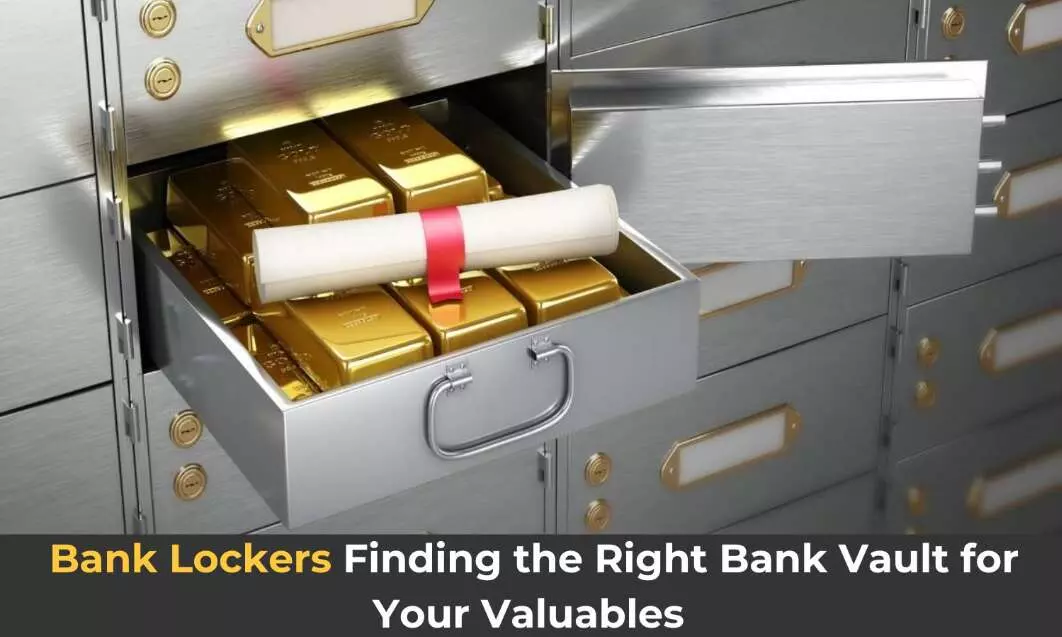Bank Lockers | Finding the Right Bank Vault for Your Valuables
Before leasing a bank locker to safeguard your possessions, it is imperative that you exercise caution and implement the requisite safety precautions.
image for illustrative purpose

Bank lockers are typically considered to be a secure and convenient method of storing valuables. Private banks, including HDFC Bank, ICICI Bank, and Axis Bank, as well as nationalised banks like Punjab National Bank, Canara Bank, and State Bank of India, provide safe deposit locker facilities.
It is always advisable to exercise caution and alertness when entrusting your possessions to external parties, such as banks. Before leasing a bank locker to safeguard your possessions, it is crucial to be aware of the potential hazards and implement appropriate safety protocols.
The annual rental fees for bank lockers typically range from Rs 1,000 to Rs 10,000; however, there are certain risks that customers may overlook. Under the guise of a lessor-lessee relationship, banks justify the financial commitment; however, the fine print in the agreement absolves them of accountability for the contents of lockers in specific circumstances.
Prior to renting a bank locker, it is important to take into account the following crucial factors:
Being close to the bank:
Picking a bank close by might be helpful if you are transporting your goods over long distances. Avoid lengthy commutes if you frequently need to move valuable possessions. This will reduce the likelihood of theft while transporting your valuables.
Easy access:
Some banks charge extra if you use your locker more than a certain number of times per year. Before making a final decision, gather information on the potential expenses. Consider how often you'll have to go to the locker. Make sure you know the bank's policies to avoid paying more than necessary.
Operating times:
Customers must also be aware of the opening and closing hours of bank branches. The working hours may vary, but on weekdays, they are typically 10 AM to 6 PM, and on Saturdays, they offer limited services only. Within these reduced business hours, bank lockers may have even shorter operating times.
Threats posed by misplaced or lost keys:
If you lose the key to your locker and try to break into it, you might have to pay a fine. This emphasises the importance of safeguarding the key to avoid unnecessary costs. Measures, such as maintaining the key in a designated, secure location at all times, should be taken to ensure its safety and security.
Insurance considerations:
Things stored in bank lockers may not be specifically insured, but homeowner policies may cover them. It is prudent to invest in insurance to safeguard the value of your most prized possessions because it protects your finances in the case of unforeseen events.
The responsible party in the event of a loss:
Banks are not liable for any losses that may occur in lockers. The RBI states that when you rent a locker, the bank is freeing itself from any responsibility in the event of a natural disaster, your carelessness, or any other unforeseen event. You must be aware that there are risks when you entrust a third party!
Rules of the Reserve Bank of India that are applicable to lockers throughout the country:
i)Banks are permitted to require a term deposit as payment for rent for a period of three years. However, the bank does not need customers to maintain a term deposit if they have an adequate savings account balance.
ii)The banks must install CCTV cameras at entry and exit points and retain the recordings for a minimum of 180 days.
iii)If valuables stored in the bank lockers are lost due to fire or theft, a customer may receive a hundred times the annual locker rent they have paid. Customers must renew their locker agreements periodically.
iv)According to the Reserve Bank of India (RBI), banks must renew the bank locker agreement with their clients by December 31, 2023.
v)Banks are not responsible for the protection of the contents in the locker, if they get damaged due to customers’ negligence or if damage occurs due to any of the following reasons - severe rains, floods, earthquakes, terrorist activity, or violence from antisocial elements
It requires a significant amount of attentiveness and knowledge to entrust your possessions to others for protection. Should you have any questions or concerns regarding the aforementioned suggestions, please do not hesitate to contact the customer service department of your bank.

